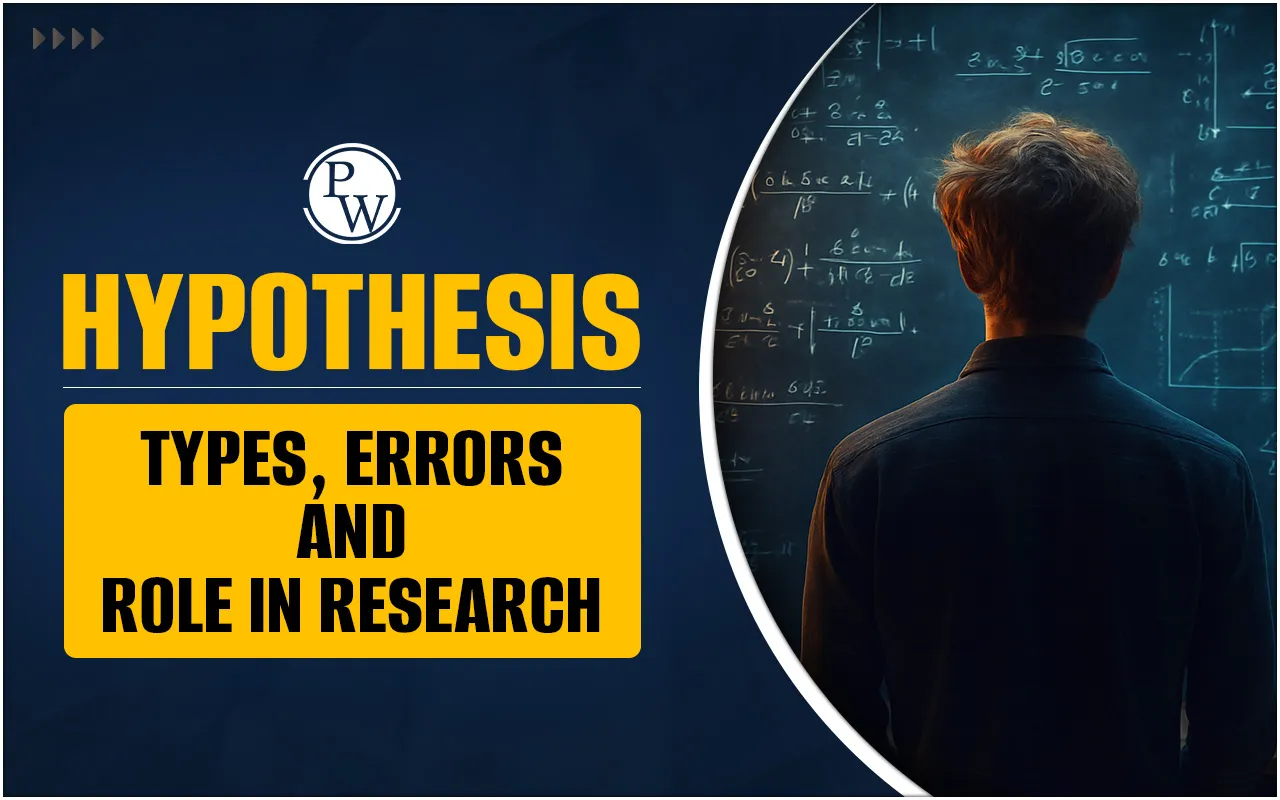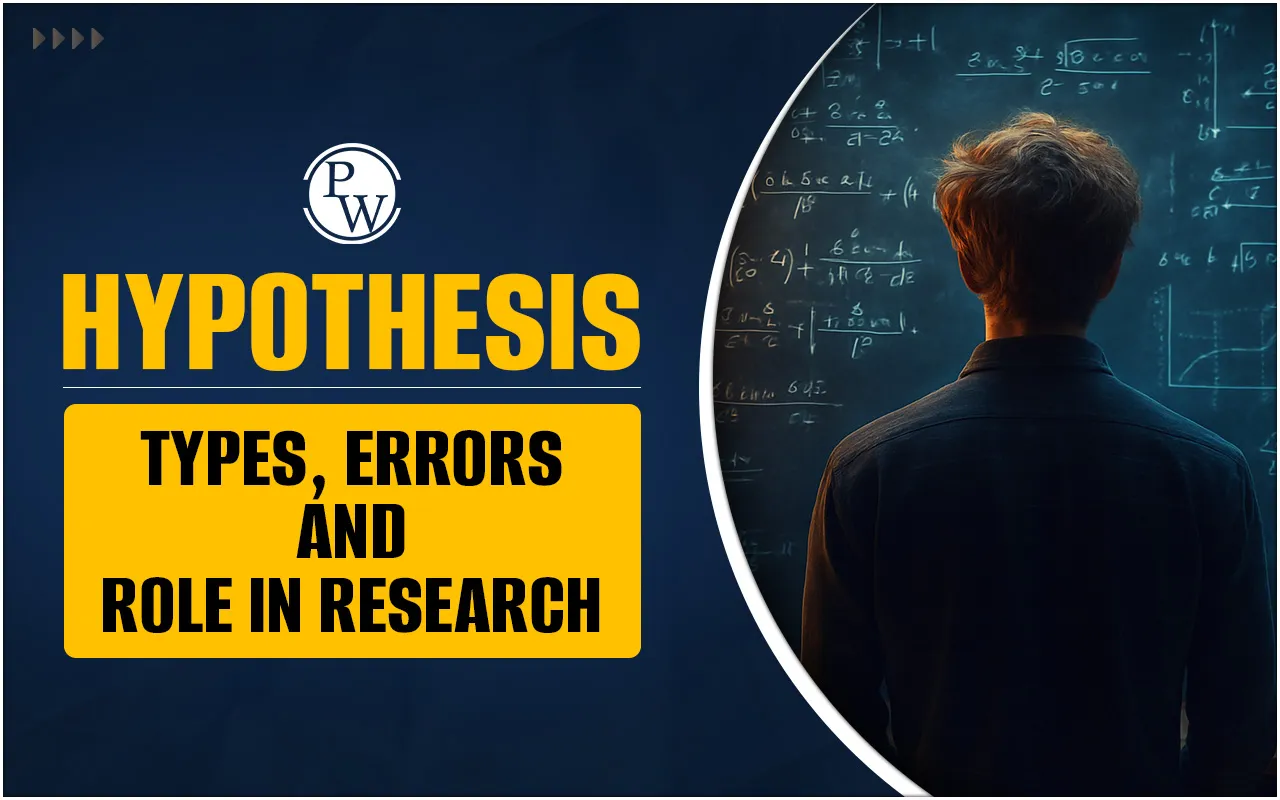

What is Hypothesis?
In research, understanding the concept of a hypothesis is crucial, as it lays the foundation for systematic investigation. In the following section, we will explore the meaning, importance, types, and role of hypotheses in guiding the research process.
A hypothesis is a formal statement that presents the expected relationship between two or more variables. It is essentially a prediction or educated guess about how things work. A hypothesis provides a tentative explanation for an observation, phenomenon, or scientific problem that can be tested by further investigation.
“A hypothesis is a tentative proposition suggested as a solution to a problem or as an explanation of some phenomenon.”
— Goode & Hatt (1952)
“A hypothesis is a tentative explanation for certain behaviors, phenomena, or events that have occurred or will occur.”
— Best, J.W. (1977)
Hypothesis: Importance and Functions
A hypothesis holds a significant place in the research process. It acts as a bridge between theory and investigation, providing a clear and focused pathway for the study. A well-formulated hypothesis not only guides the researcher in data collection and analysis but also connects theoretical assumptions with real-world observations
-
Guides Research: Helps in focusing the study and deciding what data to collect.
-
Framework for Analysis: Provides a base for interpreting the results.
-
Links Theory and Observation: Connects theoretical assumptions with practical observations.
-
Stimulates Research: Encourages thinking, exploration, and discovery.
Characteristics of a Good Hypothesis
A good hypothesis serves as a guiding light for research, and it must possess certain essential qualities to ensure clarity, direction, and reliability in the investigation.
-
Clarity: Clearly stated and unambiguous.
-
Specificity: Focused on a particular aspect of a problem.
-
Testability: Capable of being tested through empirical methods.
-
Relevance: Related to the research question.
-
Consistency: Should align with existing theories and facts.
-
Simplicity: Should be as simple as possible.
-
Objectivity: Free from personal bias or value judgments.
Types of Hypotheses
In research, different types of hypotheses are formulated based on the purpose and nature of the study. Each type plays a distinct role in guiding the investigation.
Based on Purpose:
-
Null Hypothesis (H0): Suggests no relationship or difference. Example: "There is no effect of online learning on academic performance."
-
Alternative Hypothesis (H1 or Ha): Suggests a relationship or difference exists. Example: "Online learning improves academic performance."
Based on Direction:
-
Directional Hypothesis: Specifies the direction of the relationship. Example: "Students taught through interactive methods score higher than those taught by lecture method."
-
Non-Directional Hypothesis: Indicates a difference, but not the direction. Example: "There is a difference in performance between boys and girls."
Based on the Number of Variables:
-
Simple Hypothesis: Involves one independent and one dependent variable.
-
Complex Hypothesis: Involves two or more independent and/or dependent variables.
Based on Testing:
-
Statistical Hypothesis: Involves numerical analysis and testing.
-
Research Hypothesis: Based on theory or prior research findings.
Steps in Hypothesis Testing
Hypothesis testing is a structured process used to make decisions about population parameters based on sample data. It follows a logical sequence to ensure that conclusions drawn are valid and scientific. The main steps involve formulating hypotheses, selecting a significance level, choosing the appropriate test, analyzing data, and making a decision about the null hypothesis based on the evidence.
- Formulation of Hypotheses: Identify null and alternative hypotheses.
-
Setting Significance Level (alpha or α): Usually 0.05 (5%) or 0.01 (1%).
-
Choosing the Appropriate Statistical Test: t-test, z-test, ANOVA, chi-square, etc.
-
Data Collection and Analysis: Gather data through suitable methods.
-
Computation of Test Statistics: Use appropriate formula or software.
- Decision Making:
If the p-value is less than or equal to the significance level (alpha), we reject the null hypothesis.
If the p-value is greater than the significance level, we do not reject the null hypothesis.
(Note: The p-value is the probability that the result is due to chance. A lower p-value means stronger evidence against the null hypothesis.)
Types of Errors in Hypothesis Testing
In hypothesis testing, errors can occur when the decision made about the null hypothesis is incorrect. Two main types of errors are recognized.
Type I Error (False Positive):
-
Occurs when we reject the null hypothesis (H0) when it is actually true.
-
Example: Concluding a medicine works when it actually doesn't.
-
Probability of Type I Error is denoted by alpha (α), usually set at 0.05 (5%).
Type II Error (False Negative):
-
Occurs when we fail to reject the null hypothesis when it is actually false.
-
Example: Concluding a medicine does not work when it actually does.
-
Probability of Type II Error is denoted by beta (β).
Power of the Test = 1 - β → It tells the probability of correctly rejecting a false null hypothesis.
|
Decision |
H0 True |
H0 False |
|
Reject H0 |
Type I Error (α) |
Correct Decision |
|
Do Not Reject H0 |
Correct Decision |
Type II Error (β) |
Rejection and Acceptance of Hypothesis
A hypothesis is rejected when the data provides sufficient evidence to do so. The decision is based on the p-value and the significance level:
-
Reject H0: When results are statistically significant.
-
Fail to Reject H0: When results are not statistically significant.
Remember: Not rejecting H0 does not mean H0 is true; it means there isn’t enough evidence to reject it.
Role in Research
The hypothesis plays a crucial role in the research process as it provides a clear direction for the study. It helps the researcher focus on specific objectives and prevents aimless data collection by identifying what needs to be tested. A well-formulated hypothesis serves as the foundation for selecting appropriate data collection methods, tools, and variables. It brings objectivity to the research by minimizing personal bias and ensuring that conclusions are drawn based on evidence. Once the data is analyzed, the hypothesis guides the interpretation of results, helping the researcher decide whether to accept or reject the initial assumptions. Furthermore, hypothesis testing contributes to the development and refinement of theories, playing a vital role in expanding scientific knowledge. Overall, the hypothesis is an essential element of research that fosters scientific thinking, critical analysis, and systematic inquiry.
Hypothesis FAQs
Is a hypothesis always needed in research?
Can a hypothesis be modified?
What is the difference between a theory and a hypothesis?
What does a p-value indicate?
What is the meaning of 'failing to reject the null hypothesis'?













